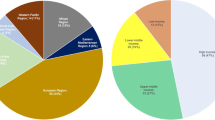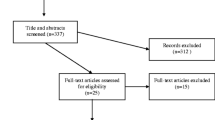Abstract
This paper aims to provide a description of how authors publishing in medical ethics journals have made use of empirical research data in papers on the topic of gamete or embryo donation by means of references to studies conducted by others (secondary use). Rather than making a direct contribution to the theoretical methodological literature about the role empirical research data could play or should play in ethics studies, the focus is on the particular uses of these data and the problems that can be encountered with this use. In the selection of papers examined, apart from being used to describe the context, empirical evidence was mainly used to recount problems that needed solving. Few of the authors looked critically at the quality of the studies they quoted, and several instances were found of empirical data being used poorly or inappropriately. This study provides some initial baseline evidence that shows empirical data, in the form of references to studies, are sometimes being used in inappropriate ways. This suggests that medical ethicists should be more concerned about the quality of the empirical data selected, the appropriateness of the choice for a particular type of data (from a particular type of study) and the correct integration of this evidence in sound argumentation. Given that empirical data can be misused also when merely cited instead of reported, it may be worthwhile to explore good practice requirements for this type of use of empirical data in medical ethics.
Similar content being viewed by others
Notes
This is consistent with the way ‘empirical’ is used in the ongoing debates around empirical bioethics. Legal research (involving the use of case studies), as well as medical or fictional case studies were excluded from this definition, as were narrative accounts of medical techniques, descriptions of the history of medical treatments, or of events, policy, law or regulation, as this kind of research did not fit the definition of ‘empirical’ being used.
References
Adams, D.H. 2013. Conceptualising a child-centric paradigm. Journal of Bioethical Inquiry 10: 369–381.
Afshar, L., and A. Bagheri. 2013. Embryo donation in Iran: An ethical review. Developing World Bioethics 13: 119–124.
Ashcroft, R. 2003. Constructing empirical bioethics: Foucauldian reflections on the empirical turn in bioethics research. Health Care Analysis 11: 3–13.
Berg, J.W. 2001. Risky business: Evaluating oocyte donation. American Journal of Bioethics 1: 18–19.
Borry, P., P. Schotsmans, and K. Dierickx. 2004. What is the role of empirical research in bioethical reflection and decision-making? An ethical analysis. Medicine, Health Care and Philosophy 7: 41–53.
Borry, P., P. Schotsmans, and K. Dierickx. 2005. The birth of the empirical turn in bioethics. Bioethics 19: 49–71.
Borry, P., P. Schotsmans, and K. Dierickx. 2006. Empirical research in bioethical journals. A quantitative analysis. Journal of Medical Ethics 32: 240–245.
Brzyski, R.G. 2001. Putting risk in perspective. American Journal of Bioethics 1: 25–26.
Burr, J., and P. Reynolds. 2008. Thinking ethically about genetic inheritance: Liberal rights, communitarianism and the right to privacy for parents of donor insemination children. Journal of Medical Ethics 34: 281–284.
Cohen, C.B. 2001. The interests of egg donors: who is deceiving whom? American Journal of Bioethics 1: 20–21.
De Vries, M., and E. Van Leeuwen. 2010. Reflective equilibrium and empirical data: third person moral experiences in empirical medical ethics. Bioethics 24: 490–498.
Dunn, M., M. Sheehan, T. Hope, and M. Parker. 2012. Toward methodological innovation in empirical ethics research. Cambridge Quarterly of Healthcare Ethics 21: 466–480.
Dresser, R. 2001. Donation, disclosure, and deception. American Journal of Bioethics 1: 15–16.
Fox, D. 2008. Paying for particulars in people-to-be: Commercialisation, commodification and commensurability in human reproduction. Journal of Medical Ethics 34: 162–166.
Frith, L. 2001. Beneath the rhetoric: The role of rights in the practice of non-anonymous gamete donation. Bioethics 15: 473–484.
Frith, L. 2012. Symbiotic empirical ethics: A practical methodology. Bioethics 26(4): 198–206.
Frith, L., and E. Blyth. 2013. They can’t have my embryo: The ethics of conditional embryo donation. Bioethics 27: 317–324.
Gurmankin, A.D. 2001. Risk information provided to prospective oocyte donors in a preliminary phone call. American Journal of Bioethics 1: 3–13.
Hedgecoe, A. 2004. Critical bioethics: Beyond the social science critique of applied ethics. Bioethics 18: 120–143.
Heng, B.C. 2008. Should fertility doctors and clinical embryologists be involved in the recruitment, counselling and reimbursement of egg donors? Journal of Medical Ethics 34: 414.
Hope, T. 1999. Empirical medical ethics. Journal of Medical Ethics 25: 219–220.
Holm, S., and M.F. Jonas. 2004. Engaging the world: The use of empirical research in bioethics and the regulation of biotechnology. Amsterdam: IOS Press.
Hurst, S. 2010. What ‘empirical turn in bioethics’? Bioethics 24(8): 439–444.
Ives, J., and M. Dunn. 2010. Who’s arguing? A call for reflexivity in bioethics. Bioethics 24: 256–265.
Ives, J., and V. Provoost. 2015. Monash editorial. Monash Bioethics Review. doi:10.1007/s40592-015-0028-9.
Jadva, V., T. Freeman, W. Kramer, and S. Golombok. 2009. The experiences of adolescents and adults conceived by sperm donation: Comparisons by age of disclosure and family type. Human Reproduction 24: 1909–1919.
Kalfoglou, A.L. 2001. Navigating conflict of interest in oocyte donation. American Journal of Bioethics 1: W1.
Kon, A. 2009. The role of empirical research in bioethics. American Journal of Bioethics 9: 59–65.
Levine, A.D. 2010. Self-regulation, compensation, and the ethical recruitment of oocyte donors. Hastings Center Report 40: 25–36.
Mastroianni, L. 2001. Risk evaluation and informed consent for ovum donation: A clinical perspective. American Journal of Bioethics 1: 28.
Molewijk, A., A. Stiggelbout, W. Otten, H. Dupuis, and J. Kievit. 2004. Empirical data and moral theory, a plea for integrated empirical bioethics. Medicine, Health Care and Philosophy 7: 55–69.
Mullen, M.A. 2001. What oocyte donors aren’t told? American Journal of Bioethics 1: W3.
Price, D. 2013. Exploitation, akrasia, and Goldilocks: How many pounds for flesh for medical uses? Medical Law Review 21: 519–552.
Ravelingien, A., and G. Pennings. 2013. The right to know your genetic parents: From open-identity gamete donation to routine paternity testing. American Journal of Bioethics 13: 33–41.
Robertson, J.A. 2010. Is there an ethical problem here? Hastings Center Report 40: 3.
Salloch, S., J. Schildmann, and J. Vollmann. 2012. Empirical research in medical ethics: How conceptual accounts on normative-empirical collaboration may improve research practice. BMC Medical Ethics 13: 5.
Sauer, M.V. 2001. Egg donor solicitation: Problems exist, but do abuses? American Journal of Bioethics 1: 1–2.
Solomon, M.Z. 2005. Realizing bioethics’ goals in practice: ten ways “is” can help “ought”. Hastings Center Report 35: 40–47.
Stock, G. 2001. Eggs for sale: How much is too much? American Journal of Bioethics 1: 26–27.
Strong, C. 2001. How should IVF programs handle initial disclosure of information to prospective ovum donors? American Journal of Bioethics 4: 23–25.
Sugarman, J., N. Kass, and R. Faden. 2009. Categorizing empirical research in bioethics: Why count the ways? The American Journal of Bioethics 9: 66–67.
Sugarman, J., and D. P. Sulmasy (Eds.). 2010. Methods in medical ethics. Georgetown University Press.
Sulmasy, D. P. 2010. Reading the medical ethics literature: A discourse on method. In: Methods in medical ethics, ed. J. Sugarman and D. Sulmasy, 315–328. Washington, DC: Georgetown University Press.
van der Scheer, L., and G. Widdershoven. 2004. Integrated empirical ethics: Loss of normativity. Medicine, Health Care and Philosophy 7: 71–79.
Weinberg, R. 2008. The moral complexity of sperm donation. Bioethics 22: 166–178.
White, G. 2001. No news here. American Journal of Bioethics 1: 29–30.
Wilkinson, S. 2012. Is the HFEA’s policy on compensating egg donors and egg sharers defensible? Medical Law Review 21: 173–212.
Acknowledgments
The author gratefully acknowledges Elke Van Hevele and Guido Pennings for their input in assessing the categories generated in the analysis and Jonathan Ives (Guest Editor), Joke Meheus, Guido Pennings and the reviewers for their valuable comments and suggestions.
Author information
Authors and Affiliations
Corresponding author
Rights and permissions
About this article
Cite this article
Provoost, V. Secondary use of empirical research data in medical ethics papers on gamete donation: forms of use and pitfalls. Monash Bioeth. Rev. 33, 64–77 (2015). https://doi.org/10.1007/s40592-015-0029-8
Published:
Issue Date:
DOI: https://doi.org/10.1007/s40592-015-0029-8




